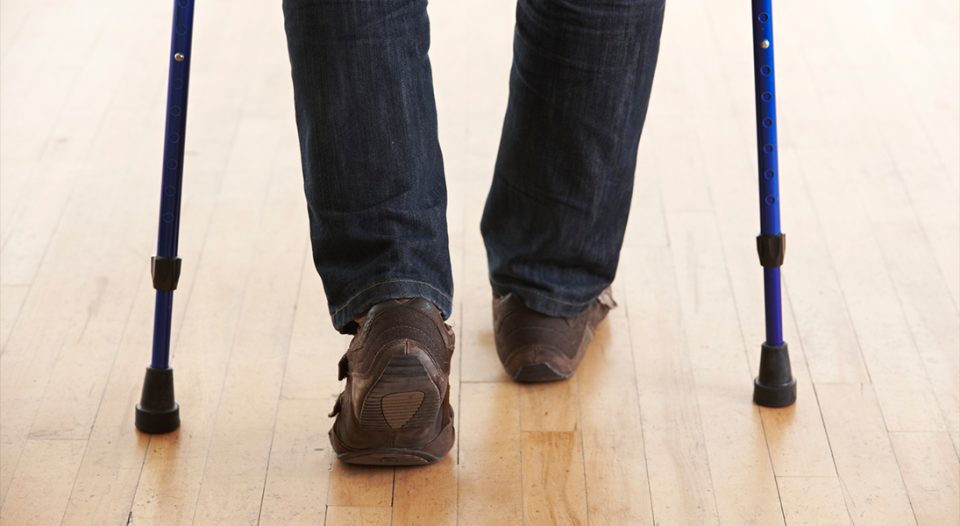At the end of Lent, during the Easter Vigil, we were lighting the Easter fire on the patio in front of our church. The wood was piled into a metal cauldron, the flame lit, the wind whipping around it. With the usual anxious anticipation, we wondered whether the candle would light and would burn long enough for us to carry it through the church doors. It did, as it always does, and we followed the cantor through the doors, singing the Easter Proclamation.
To get inside from the patio, you must ascend two short steps with a railing—a bit of a challenge for me because I walk with two canes. But I go that way on my better days because I like to come in singing with the crowd rather than go around to the accessible side door. This time I was among the first inside the church, so I happily waited near the back row for my friends to come in after me.
I’ve been a member here for a while, coming to church most Sundays, making my way up the aisle for communion and back. I sometimes serve as a lector. The congregation has valued accessibility for a long time and does fairly well in providing it. It’s one of many reasons I’m a member here. It’s a hospitable church, and I get around in it.
Pity is a corrosive thing.
Which is why I was surprised when another member, with pity on her face, clucked at my canes and asked with concern in her voice if I needed help getting seated. “Oh, no, thanks,” I said. “I’m just waiting for my friends to catch up.” She cocked her head doubtfully. “Well … if you’re sure, dear.” She patted me and went on, leaving behind a little wake of sorrow.
Her pity cast only a momentary shade over my joy at the Easter Vigil, but pity is a corrosive thing.
At least she asked if she could help and took no for an answer. Some people do neither. Once, at another church, I’d made my way to the end of the potluck line when a man suddenly swooped in and carried my plate off to a table he’d decided was the “handicapped” table. After we took a moment to recover from the surprise, my friend went to retrieve it while I found us a couple of seats elsewhere. Not that the other disabled folks at that church weren’t all lovely people to have lunch with, but why would we want to be segregated off in a corner by ourselves? We’d like to sit wherever.
Of course, people do want to be helpful and good. But imagine fending off offers of “help” such as this, many times every day. It can be wearying.
Presume competence
Many of us, especially in the church, have a narrow and often tragic view of disabled people’s lives and capabilities, reinforced by a lifetime of preaching and scriptural interpretation that supports such views.
The ELCA report “Exploring Efforts Toward Accessibility & Disability Ministries,” released in February, is a step toward greater education and awareness, not just of accessibility issues but of hospitality and inclusion in the broader sense. The reality of our lives as disabled people is much richer and more varied than many have been raised to imagine. Disability isn’t just one experience, and as disabled people, we are the experts on our lives.
That’s why Emily Ladau, in her book Demystifying Disability: What to Know, What to Say, and How to Be an Ally (Ten Speed Press, 2021), writes that one should always “presume competence.” This means, for example, that I know I need to have someone carry my plate from the potluck spread to the table, so you can presume that I’ve got that arranged before I go through the line. And if I say no to your offer of help with something, even if that might look awkward or challenging to you, I mean it.
If I say no to your offer of help, even if that might look awkward or challenging, I mean it.
Similarly, if I ask you to help me with something, you’re free to say no. I believe that’s true of any request, whether the person making it is disabled or not. There’s no need to explain—“no” is sufficient.
Sometimes incidents such as the ones I’ve described are labeled “microaggressions.” I don’t find the word appropriate in this context because it suggests that the helping person’s intent is hostile when it rarely is. I try to presume goodwill. But that doesn’t mean these patterns of behavior aren’t a problem. Pitying me “others” me, and help that isn’t wanted isn’t helpful—it’s intrusive.
I invite you to consider that your impulse to help may be prompted by feelings to sort out within yourself—the need to see yourself or be seen by others as a good person, or feelings of discomfort—rather than a disabled person’s actual need for assistance.
Pause, check in with yourself and don’t pity people with disabilities in your congregations and communities. Instead presume competence. Don’t help without asking—and never do so if we say no.





